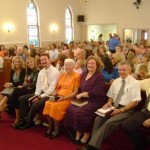Stand firm and do good – Polycarp
Here’s a challenging passage from Polycarp written to the church in Philippi sometime in the early second century:
Stand fast, therefore, in these things, and follow the example of the Lord, being firm and unchangeable in the faith, loving the brotherhood, and being attached to one another, joined together in the truth, exhibiting the meekness of the Lord in your intercourse with one another, and despising no one. When you can do good, defer it not, because “alms delivers from death.” Be all of you subject one to another, having your conduct blameless among the Gentiles,” that you may both receive praise for your good works, and the Lord may not be blasphemed through you. But woe to him by whom the name of the Lord is blasphemed! Teach, therefore, sobriety to all, and manifest it also in your own conduct. (Polycarp to the Philippians 10.1-3)
I think this would be good for all believers and churches to ponder.
Day of Discovery
In honor of Columbus Day, Dave Black has listed a few “discoveries” that he’s made concerning evangelism (Monday, October 11, 2010 at 11:02 a.m.):
The particular method of evangelism doesn’t matter that much. Anything is better than the “no” method approach.
I need to ask God to burden my heart for people. It doesn’t happen naturally.
To influence the masses, you must reach individuals.
Persuasive people live sacrificial lives.
There are millions of lost sheep out there. I’m sent to find them. Not all of them, but some of them.
Every human soul is vulnerable to prayer.
A happily married person is a walking miracle.
Anticipate difficulty. Daily.
There is no favoritism with God. None!
I need to avoid professional weaker brothers and sisters in Christ. I will never conform to their lists, so why try?
Repeated demonstrations of concern and love build openings for the Gospel.
Don’t watch the clock. It may take years for someone to come to Christ.
If you have a conscience on some matter follow it, but don’t presume that your conviction is mandatory for everyone else.
Remain a citizen of heaven, but become a naturalized citizen of the world in order to reach it for Christ.
Travel light, as the Lord commanded. It is easy to carry too much excess baggage.
Can you bake a cake? Somebody might find Christ through just such a gesture.
Evangelism begins at home but can’t end there.
I love these, because they’re challenging. Just reading through the list, I was encouraged by some and admonsihed by others.
How about you? What do you think of this list?
Which God?
Both David from “Spirit in the Wild Wood” and Arthur from “The Voice of One Crying Out in Suburbia” pointed us to a USA Today article called “Americans’ views of God shape attitudes on key issues.” According to the authors from Baylor University, Americans who believe in God describe God in one of four ways:
The Authoritative God. When conservatives Sarah Palin or Glenn Beck proclaim that America will lose God’s favor unless we get right with him, they’re rallying believers in what Froese and Bader call an Authoritative God, one engaged in history and meting out harsh punishment to those who do not follow him. About 28% of the nation shares this view, according to Baylor’s 2008 findings.
The Benevolent God. When President Obama says he is driven to live out his Christian faith in public service, or political satirist Stephen Colbert mentions God while testifying to Congress in favor of changing immigration laws, they’re speaking of what the Baylor researchers call a Benevolent God. This God is engaged in our world and loves and supports us in caring for others, a vision shared by 22% of Americans, according to Baylor’s findings.
The Critical God. The poor, the suffering and the exploited in this world often believe in a Critical God who keeps an eye on this world but delivers justice in the next, Bader says. Bader says this view of God — held by 21% of Americans — was reflected in a sermon at a working-class neighborhood church the researchers visited in Rifle, Colo., in 2008. Pastor Del Whittington’s theme at Open Door Church was ” ‘Wait until heaven, and accounts will be settled.’ ”
The Distant God. Though about 5% of Americans are atheists or agnostics, Baylor found that nearly one in four (24%) see a Distant God that booted up the universe, then left humanity alone. This doesn’t mean that such people have no religion. It’s the dominant view of Jews and other followers of world religions and philosophies such as Buddhism or Hinduism, the Baylor research finds.
I think its possible to see each of these views of God in Scripture.
Could it be that each of these “views” of God is partly right, but also partly wrong? Could it be that most people focus on only one aspect of who God is?
If so, what do you think determines which “view” of God someone takes? What can someone do to “broaden” their view of God (that is, to see more than a single perspective or aspect of who God is)?
Learning from One Another
Three years ago, I wrote a post called “Learning from One Another.” The purpose was to encourage believers to listen to and learn from one another – specifically to listen to and learn from those of different denominations, practices, and beliefs. I’d love to hear how my current readers would respond.
——————————————
This is going to be a different kind of post than I usually publish. I believe that followers of Jesus Christ should be humble enough to learn from other followers of Jesus Christ, even if those others are “different”, with “different” beliefs and “different” practices.
I believe that Baptists should learn from Presbyterians who should learn from Methodists who should learn from Disciples of Christ who should learn from Anglicans who should learn from Nondenominationals, etc. I believe that Conservatives should learn from Liberals who should learn from Moderates, etc. I believe that Moderns should learn from Postmoderns who should learn from Premoderns who should learn from Post-postmoderns, etc. We should learn from those who are different from us but who are, nonetheless, our brothers and sisters in Christ.
Therefore, I am going to ask you what you have learned from others. Here are the rules:
1. List only positive things that you have learned from other believers.
2. List only things you have learned from followers of Christ who are different from you (i.e. different denomination, philosophical worldview, hermeneutic, etc.).
3. List only positive things that you have learned (Yes, I meant to repeat this!).
Have you learned something from brothers and sisters in Christ who are different than you? Please share those with us.
——————————————
This is how I responded to my own post:
From my more reformed brothers and sisters, I’ve learned more about trusting God’s providence and protection.
From my more emerging/emergent brothers and sisters, I’ve learned that I can hold to my convictions and still listen to others and learn from their perspectives.
From my more missional brothers and sisters, I’ve learned that mission should happen every day.
From my more liberal brothers and sisters, I’ve learned that the gospel can be proclaimed with hands and feet and food and water.
From my more covenental brothers and sisters, I’ve learned that God keeps his promises.
From my more charsimatic brothers and sisters, I’ve learned to wait for the Holy Spirit.
From my more catholic brothers and sisters, I’ve learned that their is one church.
Discipling Lessons Learned
Stephen at “Chronological Bible Storying Journal – Rural Brazil” has written a very good post called “Lessons Learned: How to be a missionary.” Stephen shares some lessons that he’s learned while making disciples in Brazil.
Here are the major points:
Don’t spend your time trying to create groups.
Disciple groups that already exist.
Give preference to oral communication.
Don’t be a Bible scholar.
Be consistent and proactive.
Don’t celebrate decisions and move on.
Stephen explains each point in detail. So, jump over to his blog and read the whole thing.
What do you think of Stephen’s “lessons learned”?
Paul Came Out Running
In Acts 9, Luke narrates the account of Paul’s (Saul’s) conversion on his way to Damascus (Acts 9:1-8). God then sent Ananias to Paul (Acts 9:9-17). After Ananias spoke with Paul, he regained his sight, was baptized, ate some food, and began spending time with the believers in Damascus (Acts 9:18-19). So, what did Paul do immediately after his conversion? This is what Luke says:
And immediately he proclaimed Jesus in the synagogues, saying, “He is the Son of God.” (Acts 9:20 ESV)
So, according to Luke, Paul immediately began proclaiming that Jesus is the Son of God in the synagogues of Damascus. Paul did not spend several years alone with God preparing for “ministry” before he began proclaiming the gospel and serving people.
But, in some circles, especially around the seminary, this is exactly what is assumed. Where does this come from? Paul’s letter to the Galatians:
But when he who had set me apart before I was born, and who called me by his grace, was pleased to reveal his Son to me, in order that I might preach him among the Gentiles, I did not immediately consult with anyone; nor did I go up to Jerusalem to those who were apostles before me, but I went away into Arabia, and returned again to Damascus. Then after three years I went up to Jerusalem to visit Cephas and remained with him fifteen days. (Galatians 1:15-18 ESV)
In this passage, Paul is claiming that God had called him as an apostle, and that he accepted that role without consulting anyone else. God told him to proclaim Jesus to the Gentiles, and Paul accepted it as coming from God himself.
Paul says that he did not go to Jerusalem to talk with the other apostles immediately after his conversion. Instead, he left Damascus for Arabia, then returned to Damascus. Three years after his conversion, Paul finally went to Jerusalem and met with Peter.
But, somehow, Paul’s narration of events following his conversion have turned into a three year stint in the Arabian desert where God taught Paul and prepared him for “ministry.” I’ve heard Paul’s three years in the Arabian desert as justification for people spending three years (or more) in Bible college or seminary during which time they can focus all of their energy and resources on study. Why? Because this is their “season” for study and reflection just like Paul had his “season” for study and reflection in the Arabian desert.
There are several problems with this. First, we see that Paul begins proclaiming the gospel and serving people immediately after he was converted.
Second, Paul does not say that he was in the Arabian desert. Paul says that he went to Arabia, but Arabia was a large place. He could have meant only a few miles east of Damascus, or any of several cities with large Jewish populations in the Arabian peninsula.
Third, Paul does not say that he spent three years in Arabia. Paul says that he went from Damascus, to Arabia, then back to Damascus. Then, three years after his conversion, Paul traveled from Damascus to Jerusalem.
Fourth, Paul does not say that he spent time “alone with God” or “studying and reflecting” during his time in Arabia. In fact, Paul does not tell us what he did while he was in Arabia. If we examine Paul’s habits, it would seem likely that wherever Paul was in Arabia, and however long he stayed there, he was proclaiming the gospel and serving people.
I don’t see any justification for substituting study and reflection to proclaiming the gospel and serving people. So, is it wrong to study or go to college? Of course not. But, we should never let school or college (or work or whatever) take the place of loving people in the name of Jesus Christ. Study can supplement our evangelism and service, but it should never take the place of proclaiming the good news of Jesus Christ and caring for people in his name.
When Paul was converted, he immediately “came out of the blocks running.” That’s a pattern that we should follow and encourage other believers to follow – even new believers.
When God Changes Your Focus
Lionel from “A View from the Woods” and I have been (“online”) friends for a while now. We’ve talked on the phone a few times. So far, we have not been able to meet in person, but I think that will happen eventually.
I think Lionel has just published his best post ever. It is called “Too Busy to Love, I Mean Serve Others.” In this very personal post, Lionel talks about how God is changing his perspective to a more kingdom-focused way of looking at the world.
Consider this excerpt:
The problem is what will it cost me? Every year I have told Jesus the same lie “once this year is over, I am good, I just need to get “X†under my beltâ€. And as every waking year passes, I find myself more busy than the year before. From a worldly perspective, nothing I am saying seems to be a conflict of interest; however, from a Kingdom perspective, everything I say is a problem. You see we have developed spiritual phrases such as “seasonsâ€Â to help us defend the fact that we (I, sorry for not owning this) are not doing what Jesus has called me to do. The song says “only whats done for Christ will lastâ€. At the end of this life, I will stand before the Savior who gave up His life and tell Him, that I didn’t want to give up anything. If I were to be diagnosed with a terminal illness, would anything I have done in the last few years mean much of anything?
I have become so busy, so engulfed with my own life, my own passions, my own aspirations, my own career goals, my own….. .that I have forgot that I am a slave to another. I have forgotten that I was brought with the blood of the Son of God and that I am no longer under my own direction, my goals, aspirations and passions must be replaced with the will of another. No matter how honorable those things may be, if they are not for Christ, they are but wood, hay and stubble.
I appreciate Lionel’s honest reflection. I think this is something that we all need to consider. We may be doing good things, but are we doing kingdom-focused things? Are we truly seeking God’s kingdom first?
Once you get ’em started
A few weeks ago, one of my fellow elders said that we need to try to get the young people (children and teenagers) more involved in our church meetings. As I wrote in a previous post (see “Equipping“), I helped my son, Jeremy, get more involved by teaching one Sunday morning.
But, we also wanted the young people to understand that they could (and should) take part in the discussion and encouragement that takes place on Sundays (and anytime they are meeting with other believers). We wanted them to recognize that as children of God who are indwelled by the Holy Spirit, it is their responsibility (as much as it is the adults’ responsibility) to build up their brothers and sisters in Christ.
So, whenever one of the children or teenagers have added something to our discussion or has requested prayer or has spoken up in other ways during our church meetings, we (individually and corporately) have attempted to notice and affirm their participation.
Last Sunday, several families were traveling, so we met with a smaller than usual group. However, there were several children and teenagers (7 between the ages of 11 and (just turned) 18). For some reason, they began to take part in our discussion of Genesis. Several of them offered some very good insights, especially as we discussed Jacob’s favoritism of Joseph. (By the way, when I was talking with them later, one of the young ladies told me that she was more comfortable because there were not as many people present.)
(Irony of ironies was that the elder who encouraged us to help the young people get involved was not meeting with us Sunday.)
Later, I was talking with a brother about Sunday and the young people getting involved in the teaching and discussion. He was very excited about it too. He asked, “What do we do if one of them starts speaking too much, or starts saying things that are not true?”
He was asking honestly. But, his question is the one that is normally raised when you begin to talk about participatory meetings. What do you do when someone speaks “out of turn” (however you want to define that). The way I see it, there are two extremes that you want to stay away from.
Extreme #1: Allow anyone to say anything that they want without any consequences at all.
Extreme #2: Don’t allow anyone to speak unless you know up front what that person is going to say and how they are going to say it.
Like I said, I think the church needs to stay away from both extremes. Instead, I think we need to allow people to speak. But, if someone becomes abusive or heretical (contrary to the gospel), then we need to counsel that person – privately at first, but if it continues, it may have to be public. (I’ve never had to move beyond the “private” admonishment.)
So, what do you think about young people (children and teenagers) speaking and teaching when the church meets? What would you do if one of them (or an adult, for that matter) speaks too much or says things that are either untrue or unhelpful?
When it affects my finances
I’m encouraged (and often challenged) when believers interpret Scripture in a way that affects their own finances. (I mean, its easy to interpret Scripture in a way that affects others people.) I’m even more encouraged when they then acts on that interpretation.
I’ve linked a couple of times to Eric’s decision to resign from professional pastoring. (See his posts at “A Pilgrim’s Progress.”) Now, a missionary is examining Scripture and questioning a common practice that will also affect his own finances.
Guy at “The M Blog” says “Kingdom Giving trumps Storehouse Tithing.” Now, Guy is a missionary paid from tithes given by SBC churches to the International Mission Board. If people stopped tithing to their local church, Guy knows that he would be affected, but he says that there are more important considerations:
But if everyone practiced kingdom giving, the argument goes that our churches and programs would crumble overnight. The economic system of financing church-as-we-know-it would collapse. Would this be a bad thing? Undoubtedly things would be terribly chaotic for many of us, especially for those of us like myself who depend upon storehouse tithing/giving to pay our bills and buy our food. But I am convinced that after the dust settles from such a 9.0 magnitude earthquake by this transfer of assets from the storehouse to the kingdom, there would be a dramatic surge forward towards the fulfillment of Kingdom purposes in all spheres of life and giant steps forward in making Christ known amongst the nations.
Very encouraging… and challenging. Guy is willing to take a financial hit if it benefits the kingdom of God.
Since we’re talking about church buildings
Since my previous post was about a church deciding to sell their building so they could help more people (see “Church Sells Building to Help More People“), I thought I would also copy this gem from Dave Black (Sunday, October 3, 2010 at 7:41 a.m.):
This morning I’ll be gathering with the Body of Christ in a building dedicated to such gatherings.
Some people call it a sanctuary — a very misleading term, as the room in which we meet is no more sacred in God’s eyes than the restroom across the hall. Many followers of Jesus will prefer to meet in a home this morning instead. They seem to understand, perhaps in a deeper way than many “church-goers,” that in the kingdom, buildings aren’t sacred. When Jesus spoke with the Samaritan woman, He declared that even places we deem most sacred don’t deserve our worship. Jesus is Lord, and He can be worshipped anywhere, anytime. His “church” is nothing more than an assembly of people who have welcomed God’s kingdom into their lives and relationships. Followers of Jesus are therefore always suspicious of man-made structures that seek to replace kingdom values. The church is not a building. The church is not an institution. The church is not a program. These are only and always human creations. They never supersede kingdom authority. Or biblical authority for that matter. None of them is sacred though they often become “sacred cows.”
But there is more. Each of these things I’ve just mentioned — buildings and institutions and programs — each of them can be, indeed ought to be, dedicated as a tool for celebrating the Good News of the kingdom. When this occurs — and I’m afraid it occurs all too infrequently — the focus is no longer on physical or institutional or programmatic objectives. We now view our meeting places as nothing more than that — mere skins of the kingdom’s ferment. They are no longer the focus. We even stop idolizing them.
So, this morning I will meet with the brethren in a structure that some sacralize and that others view merely as a wineskin. The issue is one of attitude and perspective. A “religious” building can witness to our pride or to the wine. The same is true of a home fellowship. Either structure can begin to calcify. Indeed, given enough time, they probably will calcify. Then we will have to come back to the place where we started: recognizing that no place is sacred to God except in the sense that all places are sacred to God.
What a great post! What is a building (any building, even a home)? Simply a place where the church can meet. There are no holy buildings. As long as the place is not idolized (or sacralized, to use Dave’s term) and as long as the building and maintenance is not controlling how the church uses the money that God gives them, and as long as we are able to function as the church when we meet together, then who cares where the church meets?
The question is… when we meet together… whenever… and wherever… are we helping one another to live a mature life in Jesus Christ?










